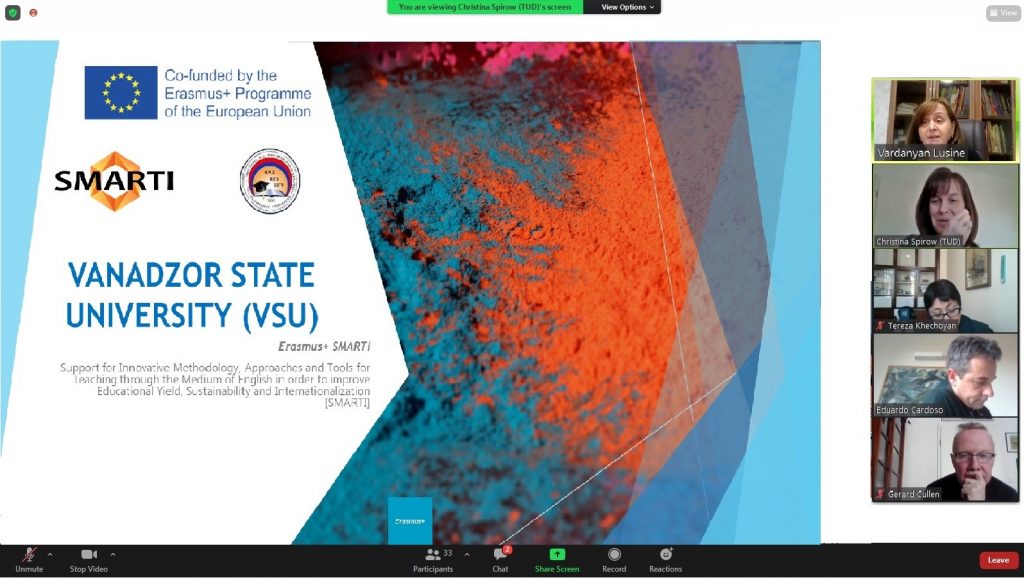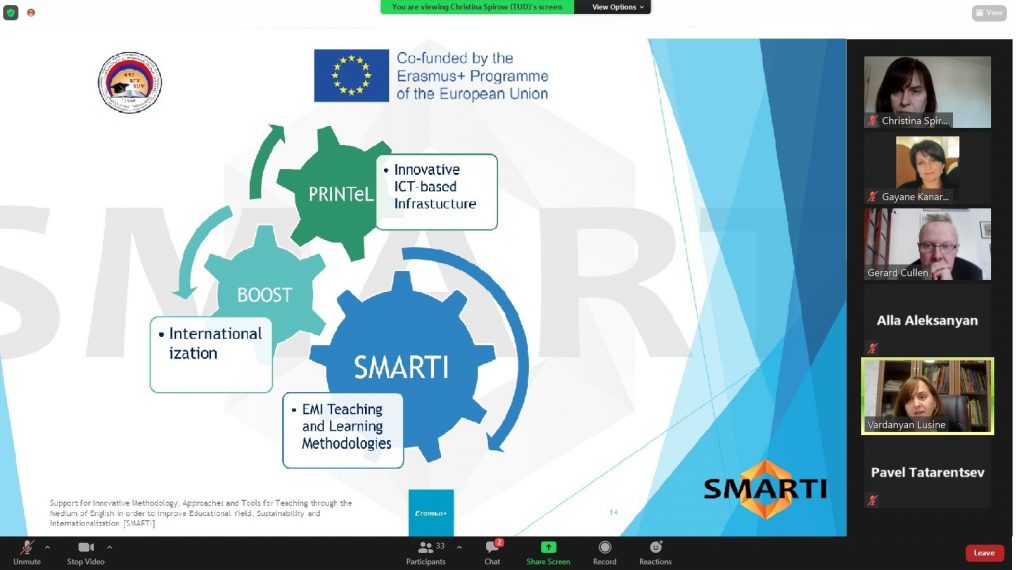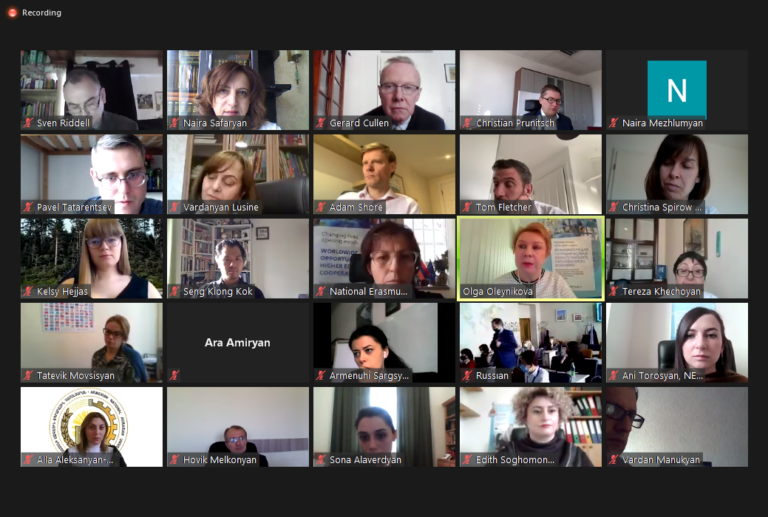Click on the logo to enter SMARTI website
SMARTI
ERASMUS + KA2, CBHE
SUPPORT FOR INNOVATIVE METHODOLOGY, APPROACHES AND TOOLS FOR TEACHING THROUGH THE MEDIUM OF ENGLISH IN ORDER TO IMPROVE EDUCATIONAL YIELD, SUSTAINABILITY AND INTERNATIONALIZATION [SMARTI]
Project Number:
617489-EPP-1-2020-1-DE-EPPKA2-CBHE-JP
Project Duration:
15 January 2021 — 14 January 2024
Project Partners:
Partner 1 Dresden University of Technology (TUD) (Project Coordinator)
Partner 2: Riga Technical University (RTU)
Partner 3: Liverpool John Moores University (LJMU)
Partner 4: Universidade Católica Portuguesa – Faculty of Biotecnology (UCP-ESB)
www.esb.ucp.pt/en/come-study-in-porto?
Partner 5: Ogarev Mordovia State University (MRSU)
Partner 6: Irkutsk National Research Technical University (INRTU)
Partner 7: Kazan Federal University (KFU)
Partner 8: Petrozavodsk State University (PetrSU)
Partner 9: Certification Association “Russian Register” (RR)
Partner 10: Public Administration Academy of the Republic of Armenia (PAARA)
Partner 11: “Vanadzor State University after H. Tumanyan” VSU
Partner 12: Armenian National Agrarian University (ANAU)
Partner 13: Mikayel Nalbandian Shirak State University (SUSh)
Partner 14: Goris State University (GSU)
Partner 15: National Centre for Professional Education Quality Assurance,Foundation ANQA
English as a Medium for Instruction (EMI) is a current phenomenon. This project can be described as innovative as it offers to develop, teach, mark, test and benchmark a sustainable model of teacher training and retraining based on EMI pedagogy integrated into the student-centered learning and the project methodology. SMARTI includes the following innovating elements:
- Development of the cross-disciplinary competence model and EMI descriptors for pedagogical skills of university teachers delivering EMI courses comparable to EU standards and national qualifications framework. It involves consideration of student-centered skills based on the requirements set by today’s labor market and employers to the quality of university graduates;
- Development of EMI educational tools and student-centered teaching methods applicable for HEIs based on the analysis of EU best practices and with regard to the characteristics of the higher education systems of the project participants;
- A student centered learning combined with the project method. The plan is to integrate this approach into existing curriculum and programme in order to create and maintain a supportive and effective EMI teaching/learning environment.
The priority of SMARTI project lies in enhancing the quality and effectiveness of teaching. The project will help improve the teaching capacity of the project participants and will benefit the higher education systems of PC by enhancing cross-disciplinary teacher competences and by introducing new approaches to education. This project will support teacher and student mobility and will attract international students at the respective universities with all the added benefits it brings. The establishment of EMI Centers will bring new academic and research networking among all partners directly involved into the project. EMI pedagogical training using the ECTS/TUNING framework as a tool of QA of academic content makes the project a “brand new” offer for both countries and their participating HEIs.
SMARTI seeks
— to promote a change in the system of pedagogic training of university teachers trought teaching academic content in English by means of a modernized curriculum for national and international spectrums.
— to assist university staff that need to teach degree programs in English and students (both national and international) who attend these programs.
-to develop transparent, national and international, educational standards and comparable learning tools and teaching standards in accordance with Bologna criteria.
— to enhance the quality of academic content and assist staff and students in the Program Countries through the development of a sustainable curriculum for teacher training.
-to provide support to the internationalisation of partner EU and PC institutions and to enhance staff and student mobility and exchanges.
-to promote PC excellence in education by the development and the implementation of a comprehensive pedagogical 9 Module English as a Medium of Instruction (EMI) curricula for in-service PC teaching staff and trainee teachers using an ECTS/Tuning Modular design for teaching academic content in English in Russia and Armenia (the focus is on all faculties MA & PhD Programs such as engineering, IT, science, mathematics. The curriculum is piloted twice before being accredited). This will be developed via a network of EMI Centres.
These goals are realistic and feasible because institutions realize the benefits, internationalisation and sustainability of MA and PhD degrees taught in English from an educational and financial point of view. The project will lead to a professional level of teaching EMI and the development of international academic exchanges.
SMARTI has 15 partners, both academic and professional, consisting of four European, 5 Russian and 6 Armenian partners, with the Technical University of Dresden (TUD) as the lead partner of this project.
The SMARTI project at VSU is coordinated by Lusik Vardanyan, Associate Professor of the Chair of Foreign Languages and Literature (contact person), Arine Danielyan, Assistant Professor of the Chair of Foreign Languages and Literature, Gayane Kanaryan, Associate Professor of the Chair of Mathematics and Informatics, Nune Khublaryan, Assistant Professor of the Chair of Mathematics and Informatics, Anna Khachatryan, Head of the Centre of Quality Assurance, and Gohar Dokholyan, International Relations and Grants Promotion Specialist.
Launch of the Erasmus +‘‘Support for Innovative Methodology, Approaches and Tools for Teaching through the Medium of English in order to improve Educational Yield, Sustainability and Internationalization’’ (SMARTI) project
From March 30 to April 1, 2021 the online kick-off meeting of the Erasmus +‘‘Support for Innovative Methodology, Approaches and Tools for Teaching through the Medium of English in order to improve Educational Yield, Sustainability and Internationalization’’ (SMARTI) project took place. The representatives from 15 institutions of the Project Consortium participated in the meeting.
Partners of the SMARTI Project:
- Technische Universität Dresden- Project Lead Partner
- Riga Technical University
- Liverpool John Moores University
- Universidade Catolica Portuguesa- Faculty of Biotechnology
- Ogarev Mordovia State University
- Irkutsk National Research Technical University
- Kazan Federal University
- Petrozavodsk State University
- Certification Association Russian Register
- Public Administration Academy of the Republic of Armenia
- Vanadzor State University after H. Toumanyan
- Armenian National Argrarian University
- Nalbandyan State University of Shirak
- Goris State University
- National Centre for Professional Education Quality Assurance
The opening keynote speeches were made by Professor Prunitsch, Dean of the Faculty of Languages and Culture of Dresden University of Technology (Germany), Gerard Cullen, the Project Coordinator, as well as Lana Karlova, Program Coordinator of National Erasmus + Office in Armenia, and Olga Oleynikova, Program Coordinator of National Erasmus + Office in Russia.
The primary goal of the project is to develop and implement nine EMI (English as a Medium of Instruction) modules in academic programs and to establish EMI centers to promote the efficiency and internationalization of education in partner universities in Armenia and Russia.
Within the three-day online meeting, the project goals and objectives, work packages, planned activities, as well as the project outcomes were discussed.
Partner institutions briefly presented their universities, the key members of the project teams, as well as the academic programs or courses targeted to be taught in English.
The VSU SMARTI team members participating in the kick-off meeting were Lusik Vardanyan, VSU Project Coordinatior, Associate Professor of the Chair of Foreign Languages and Literature, Arine Danielyan, Assistant of the Chair of Foreign Languages and Literature, Nune Khublaryan, Associate Professor of the Chair of Mathematics and Informatics, Gayane Qanaryan, Associate Professor of the Chair of Mathematics and Informatics, and Anna Khachatryan, Acting Head of the Quality Assurance Centre.



- CALL (+374.322) 41854 or 41855 - 160
- SEND E-MAIL info@vsu.am
- OUR ADDRESS Vanadzor, Tigran Mets 36


